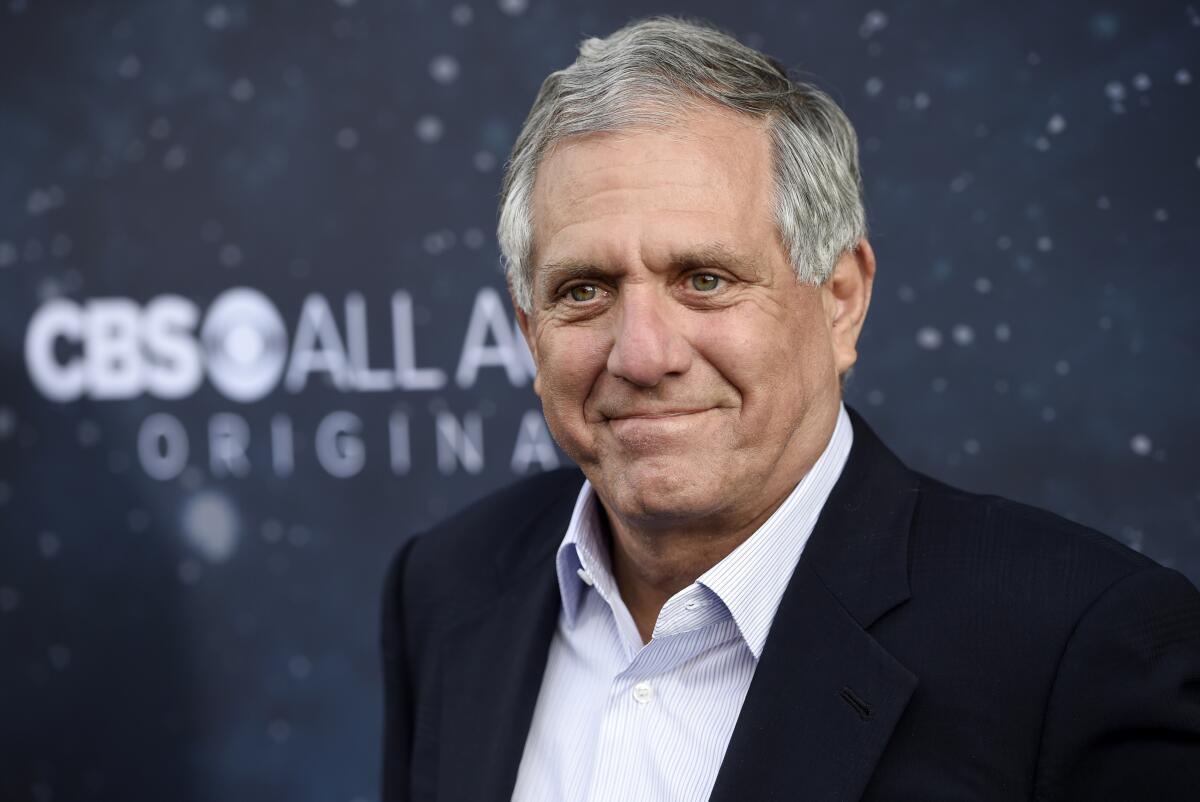LAPD watchdog to oversee investigation into cover-up of sexual assault report against Moonves

- Share via
The Los Angeles Police Department’s inspector general will oversee an investigation into how at least one LAPD official became involved in a scheme to cover up sexual abuse allegations against former CBS Corp. chief Leslie Moonves.
The civilian Police Commission directed its independent watchdog, Inspector General Mark Smith, to monitor and help guide the LAPD’s inquiry at its meeting Tuesday. The move was fueled by anger among members of the commission, who expressed dismay over the revelation that a now-retired LAPD captain allegedly helped Moonves keep the assault claims under wraps.
“This is a stunning example of what some refer to as old-school cronyism. It goes to the heart of corruption,” said commission President William Briggs, adding that he was “beyond outraged” by the findings in a report released last week by the New York attorney general’s office about the cover-up that detailed the captain’s involvement.
“This absolutely puts our city, this department in a bad light nationally, that in this day and age that type of corrupt abuse of power is still going on and it revictimizes” the victim, Briggs said.
The investigation, Smith said, will look not only into the captain’s actions but also encompass the “department’s practices” for handling sexual misconduct cases and its guidelines for off-duty work by officers.
The New York attorney general’s report did not name the captain, but the LAPD later identified him as Cory Palka, who retired as a commander and served as captain of the department’s Hollywood division in 2017 and 2018.
Palka is accused of alerting CBS executives that a woman had come to the Hollywood station to file a report accusing Moonves of assaulting her in a restaurant parking lot many years before.
Palka’s call set in motion an elaborate cover-up involving Moonves and senior CBS officials. According to the New York attorney general’s report, Palka had been friendly with the company executives after serving on Moonves’ security detail for the Grammy Awards for several years, the report said.
The report has drawn swift condemnation from victims’ rights advocates, who said it highlighted the immense challenges women still face in bringing complaints of misconduct and the role that powerful interests, such as CBS and the LAPD, play in subverting those complaints.
Commissioner Eileen Decker echoed Briggs’ anger at Tuesday’s meeting, saying that the episode “takes us far backwards.” She later told Smith that she expected the investigation to look at any department employee, both current and retired, “who was involved.”
“You have that clarification, right, inspector general?” she asked.
“Absolutely,” he responded.
Decker also asked that the inspector general’s office “review or evaluate all department procedures” concerning the handling of sexual assault reports and then report its findings to the commission. The probe, she said, should “look broadly at best practices and procedures and ... not limit its view to police departments.”
LAPD officers moonlighting as security guards for Los Angeles’ elite — from Hollywood producers to record label executives — is nothing new. But given the revelations in the Moonves case, Commissioner Lou Calanche suggested the investigation should take a closer look at “what policies and procedures there are for reporting who [officers] are working for and if there’s any potential conflict or conflict of interest.”
LAPD Chief Michel Moore said that a review of off-duty work permits was already underway. He acknowledged the breach in trust that Palka’s alleged actions had caused and promised that the department’s investigation would leave “no stone unturned on this.”
In addition to its internal review, the LAPD is cooperating with parallel investigations by the California and New York attorney general offices.
Moore said the department would soon transition to a computerized system that will track who accesses crime reports and guard against lapses like the one involving Palka.
For decades, some department reports were kept on paper, “which doesn’t have the accountability; copies can be made without any record of it,” he said. The department expects to begin using its new system, which remains in “the design stages,” in January, he said.
The Los Angeles Times in 2018 reported on the allegations of Moonves’ accuser, Phyllis Golden-Gottlieb, which came as the #MeToo movement was in full swing.
After she went to the Hollywood Division station to make a report, Palka left a voicemail message for a CBS executive on Nov. 10, 2017, according to the New York attorney general’s report. In it, Palka reported that “somebody walked in the station about a couple hours ago and made allegations against your boss regarding a sexual assault,” the report found.
Palka secretly provided Moonves and other CBS executives with updates on the progress of the LAPD’s investigation, the attorney general’s report said. He also provided them with personal details about Golden-Gottlieb, even slipping them a copy of the report she filed, the report said.
CBS executives used the information to pry into “the victim’s personal circumstances and that of her family,” the report said.
Times staff writers Meg James and Richard Winton contributed to this report.
More to Read
Sign up for Essential California
The most important California stories and recommendations in your inbox every morning.
You may occasionally receive promotional content from the Los Angeles Times.











